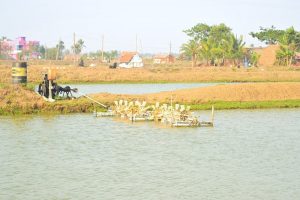Illegal shrimp farms threaten agri, Bhitarkanika biodiversity

Kendrapara: Illegal shrimp enclosures, spreading across more than 20,000 acres in this district, have emerged as a major threat to the local agriculture and the biodiversity of Bhitarkanika National Park, apart from creating law and order issues.
Reports said saline water entering through canals into these shrimp enclosures has raised concerns among local farmers.
Earlier, the Orissa High Court had taken suo motu cognisance of the matter and ordered the demolition of unauthorised farms.
Advocate Mohit Agarwal was appointed amicus curiae to monitor the situation. However, administrative inaction has delayed the implementation of the court order.
Social worker Jyotiranjan Patri said the district administration initially took limited action, but legal hurdles ensued as three separate counter petitions were filed by shrimp closure owners, asserting that their operations were lawful.
In the first case, nine petitioners argued that they were farming shrimp on their own land for livelihood purposes without causing environmental damage.
In the second petition, 17 applicants claimed that they were using modern techniques in line with current aquaculture practices.
Likewise, the third petition, involving 17 farmers, stated that their operations complied with all the legal requirements. With the legal status of many enclosures under question, the administration has been tasked with verifying which are legal and which are not.
Social activist Biren Kumar Das said shrimp enclosures pose a dual threat – endangering Bhitarkanika’s biodiversity and salinising nearby farmland.
This has led to frequent conflicts between local farmers and enclosure owners. Law and order issues have been reported in Mahakalapada, Rajnagar and Rajkanika blocks. In Rajnagar’s Kurunti panchayat, a shooting incident occurred in connection with shrimp farming disputes.
In Petchela revenue village of Mahakalapada tehsil, villagers clashed with enclosure owners over 39 acres of forest and pasture land converted for shrimp farming.
Rajkanika has seen disputes over saltwater inflow through canals built for shrimp farms. Environmentalist Hemanta Kumar Rout said wastewater and air pollution from the enclosures are harming the local ecosystem.
He cited Jagatjora in Bhitarkanika as a clear example where toxic wastewater from shrimp farms is damaging marine life and nearby mangrove forests. Rout attributed the presence of these farms to the non-listing of Bhitarkanika as a UNESCO World Heritage Site. A UNESCO team had visited the park in 2016 and raised concerns about the shrimp enclosures.
The team urged the district administration to immediately remove enclosures built on forest land. However, shrimp farm owner Satyendra Das countered that the district lacks effective employment schemes.
He noted that many migrant workers returned home jobless after the COVID-19 pandemic and turned to shrimp farming, which has received support from both the Union and state governments.
Das argued that since farming is conducted under the Coastal Aquaculture Authority Act, the administration should identify appropriate zones to support livelihoods in the coastal belt.
Additional District Magistrate Rabindra Mallik confirmed that demolition work is underway in line with the court’s order.
He said some owners have approached the court, and investigations are ongoing to determine the legality of their farms.
PNN
News